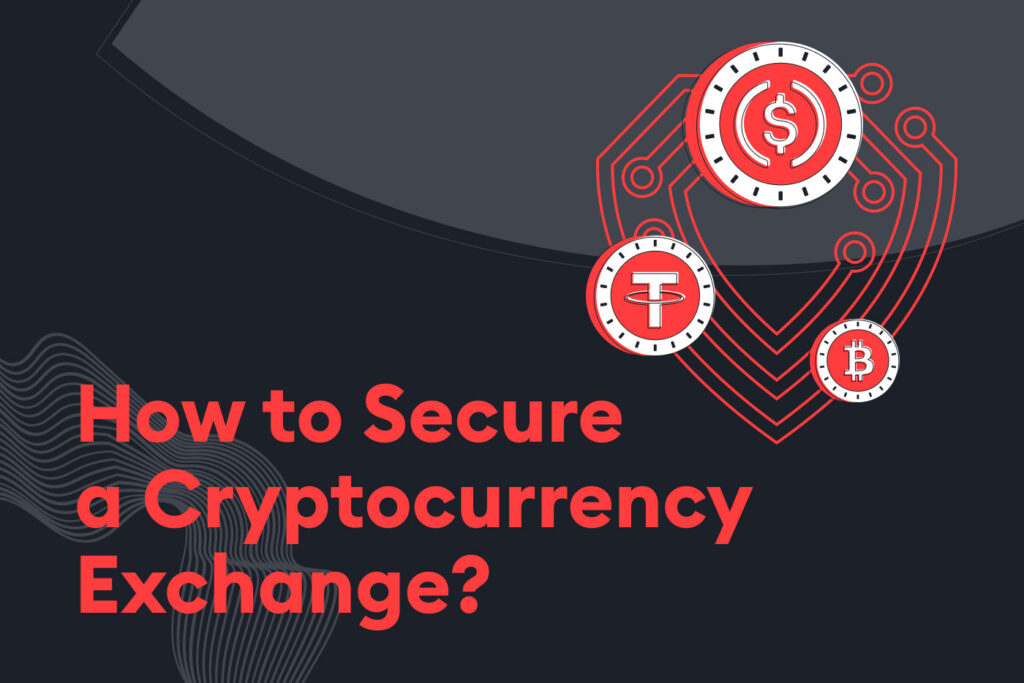Secure Cryptocurrency Exchange
The ascent of digital forms of money has changed the monetary world, introducing new open doors and difficulties. One of the essential worries in this advancing scene is the security of digital currency trades. These stages work with the exchanging, purchasing, and selling of advanced monetary standards, making them ideal objectives for cyberattacks. This paper digs into the critical parts of getting a cryptographic money trade, featuring the significance of strong safety efforts, the normal dangers confronted, and best practices for guaranteeing the security of client assets and information.

On the off chance that you’re keen on purchasing digital currency, you want to open a record with a crypto trade. There are around 500 trades to browse, and Forbes Consultants searched through the main crypto trades to decide the best crypto trade for both new and experienced financial backers.
Significance of Safety in Digital Money Trades
Digital money trades are the foundation of the crypto environment, empowering liquidity and cost revelation for different computerized resources. Given their basic job, guaranteeing their security is vital in light of multiple factors:
Client Trust: Clients endow trades with their assets and individual data. Any break can prompt huge monetary misfortunes and a deficiency of confidence in the stage.
Market Soundness: Security occurrences can prompt market unpredictability. A significant break can cause alarm offerings, prompting a sharp decrease in resource costs.
Administrative Consistence: Numerous purviews have severe guidelines about the security of monetary stages. Rebelliousness can bring about lawful punishments and loss of working licenses.
Notoriety The board: A safe trade upgrades its standing, drawing in additional clients and expanding its piece of the pie.
Normal Security Dangers
Cryptographic money trades face a bunch of safety dangers. Understanding these dangers is the most important move toward relieving them.
Hacking and Cyberattacks: The most immediate danger comes from programmers endeavoring to acquire unapproved admittance to the trade’s frameworks to take reserves.
Phishing Assaults: Aggressors use phishing to fool clients into uncovering their login qualifications, prompting account split the difference.
Insider Dangers: Representatives or previous workers with admittance to basic frameworks might abuse their honors for monetary profit.
Disseminated Forswearing of Administration (DDoS) Assaults: These assaults expect to overpower the trade’s servers, causing personal time and keeping clients from getting to their records.
Programming Weaknesses: Bugs or weaknesses in the trade’s product can be taken advantage of by assailants to acquire unapproved access or disturb tasks.
Best Practices for Getting a Digital Currency Trade
To shield against these dangers, digital money trades should execute a far-reaching security methodology. The following are a few prescribed procedures:

Hearty Confirmation Instruments
Two-Component Confirmation (2FA): Compulsory 2FA for all client records can fundamentally upgrade security by requiring an extra check step past a secret phrase.
Multi-Mark Wallets: Utilizing multi-signature wallets for putting away client assets can guarantee that no single substance has unlimited authority over the resources, decreasing the gamble of insider dangers.
Information Encryption: Scrambling touchy information both on the way and very still guarantees that regardless of whether the information is caught or gotten to without approval, it stays incoherent.
Secure Attachment Layer (SSL): Executing SSL for all web traffic safeguards information trades among clients and the stage from snooping.
Ordinary Security Reviews and Infiltration Testing
Outsider Reviews: Ordinary security reviews by legitimate outsider firms can distinguish and correct weaknesses.
Entrance Testing: Directing occasional infiltration tests reproduces genuine assaults, assisting with uncovering and fixing expected shortcomings.
Cold Capacity for Assets
Cold Wallets: Putting away most of the assets in chilly wallets, which are disconnected and not associated with the web, limits the gamble of hacks.
Customary Exchanges: Routinely moving assets from hot wallets (on the web) to cold wallets can decrease the openness of client assets to possible internet-based dangers.
Moderation Administrations: Using DDoS alleviation administrations can help ingest and avoid assault traffic, guaranteeing the trade stays functional.
What Is a Crypto Trade?
A crypto trade is a commercial center where you can trade digital currencies, such as bitcoin, Ether, or Dogecoin. Digital currency trades work a ton like other exchanging stages that you might know about. They give you accounts where you can make different request types to purchase, sell, and guess in the crypto market.
Some crypto trades support progressed exchanging highlights like edge records and prospects exchanging, albeit these are less generally accessible to U.S.-based clients. Others have highlights like crypto marking or crypto advances that permit you to procure interest on your crypto property. The best trades offer instructive contributions to stay up with the latest on all things crypto.
Rate Restricting and Traffic Examination: Executing rate restricting and breaking down traffic examples can help distinguish and moderate DDoS assaults continuously.
Representative Preparation and Access Control
Security Mindfulness Preparing: Standard instructional courses for workers can help them perceive and answer security dangers.
Access Control Arrangements: Carrying out severe access control approaches guarantees that representatives have just the fundamental authorizations expected to play out their work capabilities.
Episode Reaction Plan
Readiness: Having an obvious occurrence reaction plan set up guarantees that the trade can rapidly and successfully answer security breaks.
Normal Drills: Leading ordinary bores and refreshing the reaction plan because of illustrations learned can work on the trade’s strength to assaults.

Administrative Consistence and Best Practices
Sticking to Norms: Adhering to industry guidelines and administrative necessities can improve security and guarantee consistency with lawful commitments.
Joint effort with Specialists: Laying out a helpful connection with administrative specialists and different trades can work with data sharing and work on general security.
Contextual Analyses of Eminent Security Episodes
Analyzing past security occurrences can give important examples to further develop security rehearses. The following are two eminent models.
Occurrence: When the world’s biggest Bitcoin trader, Mt. Gox sought financial protection in the wake of losing roughly 850,000 Bitcoins because of a progression of hacks and bungle.
Examples Took in: The significance of straightforwardness, normal reviews, and appropriate administration of client reserves. It additionally featured the requirement for further developed safety efforts and administrative oversight.
Various Kinds of Crypto Trades
By and large, there are two classifications of crypto trades: brought together trades and decentralized trades. Every classification accompanies its benefits and hindrances.
Concentrated Trades
By far most crypto exchanging happens on incorporated trades.
Some crypto aficionados object to concentrated trades since they conflict with the decentralized ethos of digital money. Far more terrible according to some crypto clients, the organization or association might expect clients to follow Know Your Client (KYC) rules. These require every client to unveil their personality, much as you would when you apply for a financial balance, to battle tax evasion and extortion.

Coincheck (2018):
Occurrence: Coincheck, a significant Japanese trade, lost more than $530 million worth of NEM tokens in a hacking episode.
Examples Took in: The need to involve cold capacity for a lot of assets, the significance of multi-signature wallets, and the basic job of strong confirmation components.
The security of digital currency trades is critical for the supported development and soundness of the cryptographic money environment. As advanced resources become more standard, the dangers and provokes confronting these stages will keep on developing. By executing vigorous safety efforts, leading ordinary reviews, and encouraging a culture of safety mindfulness, trades can safeguard client assets and information, in this way keeping up with trust and trust in the crypto market. Guaranteeing the security of cryptographic money trades isn’t just about innovation; it requires a comprehensive methodology that incorporates individuals, cycles, and consistency with administrative norms.
Digital money trades act as indispensable stages where clients can purchase, sell, or exchange different digital forms of money like Bitcoin, Ethereum, and numerous others. These trades have capabilities likewise to stock trades yet work in a decentralized biological system, working with computerized cash exchanges. Nonetheless, as the digital money market has filled dramatically in the beyond couple of years, so too have security dangers. With hacking episodes and cyberattacks becoming predominant, the requirement for secure cryptographic money trades is basic. A protected trade shields client resources as well as upgrades trust in the framework. This article examines the critical parts of what comprises a safe cryptographic money trade, procedures for further developing trade security, and instances of best practices in the business.
Security Dangers in Digital Money Trades
Before plunging into the ways of getting a trade, it’s critical to comprehend the various sorts of safety gambles that exist in the cryptographic money scene. These include:
Hacking and Cyberattacks: Cryptographic money trades have been ideal objectives for programmers because of the huge worth held in advanced wallets. A few striking breaks incorporate the Mt.Gox exchange in 2014, where more than 850,000 bitcoins were taken, and the Coincheck hack in 2018, which achieved a lack of more than $500 million in computerized monetary forms.
Phishing Attacks: Phishing attacks are mischievous undertakings by software engineers to get fragile client information by imitating trusted components. In the crypto world, this much of the time incorporates fake exchange locales or misleading messages mentioning that clients disclose their login authorizations.
Insider Dangers: Not all dangers are outside. Representatives of workers for hire with inside admittance to a trade’s framework can in some cases take part in false exercises, like taking assets or controlling the trade framework.
Programming Bugs: Cryptographic forms of money and their foundation are driven by complex calculations and programming codes. Neglected weaknesses or coding mistakes can give programmers valuable chances to take advantage of and break trade frameworks.
Elements of a Protected Digital Currency Trade
Given the wide cluster of possible dangers, secure digital currency trades should carry out a scope of defensive measures. Here are a portion of the basic highlights that each safe trade ought to have:
a. Two-Variable Verification (2FA)
Two-factor verification adds a layer of safety by expecting clients to affirm their personality through two methods: something they know (like a secret phrase) and something they have (like a one-time code shipped off their cell phone). Executing 2FA fundamentally lessens the probability of unapproved admittance to client accounts.
b. Cold Capacity
Cold capacity alludes to keeping a huge part of the trade’s digital money resources disconnected, in a solid actual climate, away from the web. This diminishes the gamble of hacking since disconnected wallets are not vulnerable to online assaults. Cold capacity can take many structures, including equipment wallets, USB drives, or even paper wallets. The overall business standard is for trades to store between 70-90% of client resources in a chilly capacity.
c. Encryption Conventions
A safe digital money trade should encode touchy client information, including individual data and passwords. Solid encryption conventions like SSL (Secure Attachments Layer) or TLS (Transport Layer Security) guarantee that information being communicated among clients and the trade stays classified and shielded from snooping or interference by programmers.
d. Multisignature Wallets
Multisignature (multisig) wallets require numerous confidential keys to approve a digital money exchange, as opposed to only one. This implies that regardless of whether one key is compromised, the programmer can’t take the assets without acquiring the other keys. Carrying out multi-sig wallet upgrades security for the two clients and trades.
e. Ordinary Security Reviews
Regular security reviews by outsider firms assist with recognizing weaknesses in the trade’s framework before they can be taken advantage of. These reviews frequently include entrance testing, code surveys, and appraisals of the stage’s foundation.
Client Training and Backing
Indeed, even the most reliable trade can be defenseless on the off chance that clients don’t follow appropriate security rehearses. Trades ought to teach clients about safe practices, for example, staying away from phishing endeavors, areas of strength for utilizing, and empowering two-factor verification. Exhaustive client assistance administrations are additionally crucial to address any security concerns or breaks instantly.
Administrative Consistence and Authorizing
Secure digital currency trades work under the rules of administrative systems and are frequently expected to get licenses to legitimately work. Sticking to consistence norms upgrades dependability and gives a defense against illegal exercises, for example, tax evasion or extortion.
Know Your Client (KYC): Most controlled trades expect clients to go through personality confirmation through KYC conventions. This includes clients submitting ID records and individual data to check their personality, decreasing the gamble of crimes on the stage.
Hostile to Tax evasion (AML): Trades are likewise expected to execute AML strategies, which screen exchanges for dubious exercises that might show illegal tax avoidance.
Information Security Guidelines: Secure trades likewise follow information security regulations, like the Overall Information Assurance Guideline (GDPR) in the European Association, to guarantee client information is dealt with capably and safely.
Decentralization and Decentralized Trades (DEXs)
While numerous digital currency trades are unified, meaning they are worked by a solitary element that controls client reserves, decentralized trades (DEXs) have arisen as a safer other option. DEXs work on blockchain innovation and brilliant agreements, permitting clients to exchange cryptographic forms of money straightforwardly with each other without depending on a mediator.
In a decentralized trade:
Clients keep up with control of their confidential keys and assets consistently.
There is no essential issue of disappointment, making it less vulnerable to hacking.
Exchanges are led straightforwardly between clients, decreasing the gamble of insider dangers or extortion.
While DEXs offer improved security and protection, they can be more difficult to use for amateurs and frequently miss the mark on the liquidity of unified trades.
Best Practices for Clients
As well as utilizing a solid trade, clients should find proactive ways to safeguard their resources. A few prescribed procedures include:
Utilizing Solid, Extraordinary Passwords: Reusing passwords across various stages increments weakness. Clients ought to create solid, exceptional passwords for their digital currency trade. Records and store them in a protected secret phrase supervisor.
Routinely Checking Records: Watching out for account action can assist clients with distinguishing dubious ways of behaving early. Any unapproved login endeavors or unpredictable withdrawals ought to be accounted for to the trade right away.
Avoiding Public Wi-Fi for Trades: Public Wi-Fi networks are much of the time unsound. And including them for advanced cash trades could open clients to attacks. If getting to an exchange while traveling, it’s endorsed to use a Virtual Classified Association (VPN) for added security.
Utilizing Equipment Wallets: For long-haul digital currency possessions, equipment wallets offer improved security as they store private keys disconnected. This lessens the gamble of hacking or robbery.
Instances of Secure Digital Money Trades
A few digital money trades have set industry norms for security:
Coinbase is one of the biggest and most legitimate digital currency trades universally. Offering an easy-to-use interface and hearty safety efforts like 2FA, cold capacity, and ordinary security reviews.
Binance is known for its huge determination of digital currencies and high liquidity. It utilizes state-of-the-art security advances, for example, man-made consciousness to screen exchanging movement for dubious ways of behaving.
Kraken is commended for its security-first methodology, offering progressed security highlights like multi-sig wallets, PGP encryption, and ordinary framework reviews.
The significance of safety in cryptographic money trades couldn’t possibly be more significant. As the computerized cash market keeps on developing. So too does the requirement for hearty safety efforts to safeguard both the trades and their clients. By carrying out practices like two-factor confirmation, cold capacity, and standard security reviews. Trades can limit the dangers of cyberattacks and encourage trust in the more extensive cryptographic money biological system. Simultaneously, clients should remain watchful and embrace secure practices to guarantee their resources stay safeguarded. Together, these endeavors can assist in building a more secure, safer future for the digital money industry.


